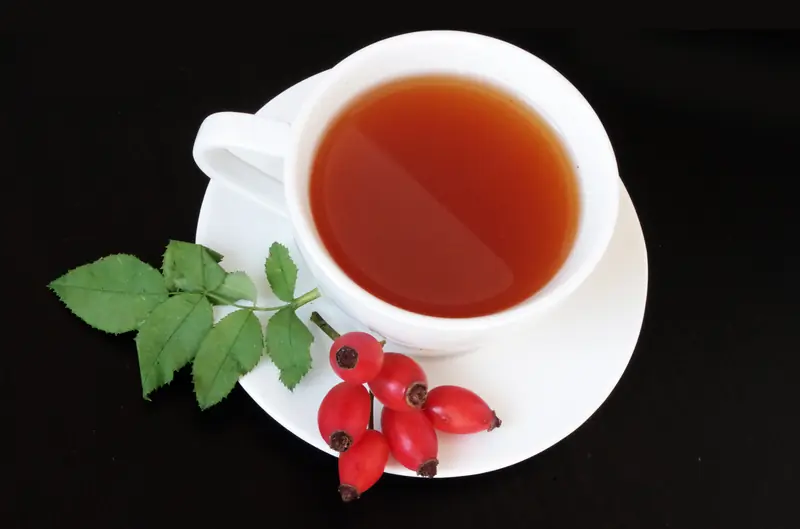
As spring arrives, many people experience fatigue and a decline in well-being, often accompanied by lethargy, apathy, drowsiness, confusion, and deterioration of hair and nails, as well as pale and dry skin. What typically happens to us at the beginning of the spring season is referred to by doctors as avitaminosis or vitamin deficiency.
The Essential Vitamin Champion
Every part of the rosehip plant has healing properties, but the highest concentration of beneficial substances is found in its fruits. Their composition is unique—containing ascorbic acid, nicotinic acid, and other organic acids, as well as vitamins A, B1, B2, E, K, P, PP, along with iron, sodium, phosphorus, magnesium, potassium, calcium, and more. Rosehips are rich in essential oils and tannins.
All these beneficial properties are successfully utilized in traditional or folk medicine as a remedy that:
- treats inflammatory processes;
- accelerates wound healing;
- dissolves stones in the kidneys and gallbladder;
- helps restore the body after severe and prolonged illnesses;
- normalizes overall metabolism, stimulates the body’s immune defenses, and serves as a preventive measure against colds;
- rejuvenates the skin.
Rosehip-based remedies contribute to improved health: after their consumption, blood pressure stabilizes, cholesterol and blood sugar levels decrease, and pain from inflammatory processes—such as arthritis, arthrosis, and gout—is alleviated. Additionally, rosehip berries are the best friends of your nails and hair, as they promote nail growth and strengthen hair structure.
Despite its unique healing properties, doctors and herbalists advise consuming rosehip in moderation.

Is There Any Harm from Rosehip? Precautions When Consuming
Regular consumption of various rosehip drinks can negatively affect liver function. It’s best to combine tinctures of different medicinal plants: this way, they won’t become monotonous, and the human body can be enriched with a variety of beneficial substances and trace elements. However, excessive consumption of rosehip can lead to issues with the circulatory system, including the development of tachycardia and increased blood clotting. People prone to thrombosis are advised by doctors to consume this plant with caution.
Another caution: because rosehip infusions and decoctions contain a high level of acidity, this can negatively impact tooth enamel. For the same reason, it’s advisable to avoid rosehip-based products if you have gastritis, peptic ulcers, or duodenal ulcers.

A Helper in Cosmetology
Modern cosmetology utilizes the wealth of the plant world in various ways. Experts in this field note that natural rosehip oil is a true “savior” for dry, depleted, and dehydrated skin, and it serves as an effective complement to professional facial and body care. Rosehip oil is packed with skin-beneficial vitamins and unique fatty acids, making it capable of enhancing skin quality and addressing imperfections.
Moisturizes
Red berry oil contains linoleic acid, which supports cell membranes and the skin’s hydrolipid mantle, preventing moisture loss. Thanks to its lightweight consistency, the oil leaves the skin smooth and silky while deeply hydrating it.
Brightens
Natural rosehip oil is rich in vitamins A and C, which have the ability to restore damaged skin cells. This helps to eliminate dullness from the face and impart a light, bright tone with a healthy glow. Vitamins A and C also stimulate collagen production, which is crucial for skin elasticity and firmness.
Fights Inflammation and Skin Breakouts
Vitamin E found in rosehip has anti-inflammatory and antioxidant properties, so tea made from its fruits can aid in treating colds, while the oil can be applied topically to reduce breakouts. Specifically, rosehip oil soothes irritation and skin conditions such as psoriasis, eczema, and dermatitis.
Helps Reduce Hyperpigmentation
Many people wish to tackle unwanted pigmentation spots, scars, and fine lines. Rosehip oil comes to the rescue!
Research shows that lycopene and beta-carotene found in rosehip have exceptionally powerful skin-brightening properties, making them key components in many anti-pigmentation products. They can help reduce scars and fine lines. Additionally, rosehip oil contains numerous essential fatty acids and antioxidants, which are vital for tissue and skin cell regeneration. It’s no wonder that this oil has been used for centuries as a folk remedy for quick wound healing and for reducing scars and fine lines.
So, stay healthy and beautiful every spring (and beyond!) with the unique vitamin champion—rosehip!

